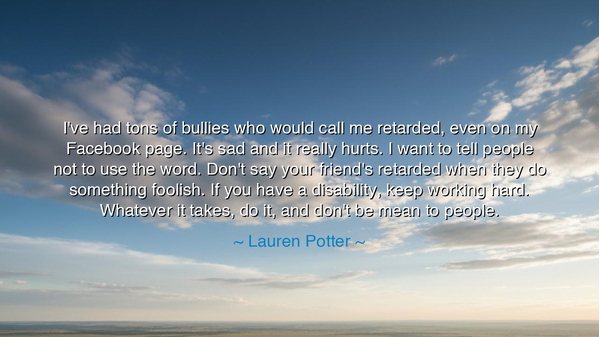
I've had tons of bullies who would call me retarded, even on my
I've had tons of bullies who would call me retarded, even on my Facebook page. It's sad and it really hurts. I want to tell people not to use the word. Don't say your friend's retarded when they do something foolish. If you have a disability, keep working hard. Whatever it takes, do it, and don't be mean to people.






There is both sorrow and luminous strength in the words of Lauren Potter, who said, “I've had tons of bullies who would call me retarded, even on my Facebook page. It's sad and it really hurts. I want to tell people not to use the word. Don't say your friend's retarded when they do something foolish. If you have a disability, keep working hard. Whatever it takes, do it, and don't be mean to people.” In this humble declaration, we hear the voice of courage rising from pain — a voice that transforms cruelty into compassion, and suffering into wisdom. Hers is not the bitterness of a wounded soul, but the fierce gentleness of one who has chosen love over resentment.
The origin of this quote lies in the real experiences of Lauren Potter, an actress and advocate born with Down syndrome, who rose to fame through her role on Glee. In a world that too often dismisses difference, she endured the cruelty of words — the sharpened insults that seek to reduce a person’s worth. Yet instead of meeting hate with hate, she turned her experiences into a message of kindness and perseverance. Her pain became her platform. The same tongue that was wounded by insult now speaks healing into the hearts of others.
In her plea, we find a lesson as ancient as time: that words are not small things. The ancients knew that language is sacred — that to speak is to create, and to insult is to destroy. The Greek philosopher Heraclitus wrote that the tongue is both a flame and a tool, capable of warming hearts or burning them to ash. When Potter says “don’t use the word,” she is not merely calling for politeness; she is calling for reverence — for the recognition that every soul, regardless of ability or difference, carries divine dignity. The careless word may seem fleeting, but its wound can echo for years.
Consider the story of Helen Keller, who was once locked in silence and isolation until her teacher, Anne Sullivan, taught her the meaning of words. Through patience and love, Keller came to understand that language was the key to connection and freedom. For her, words were salvation. How tragic, then, that for others, words become chains. Lauren Potter’s warning is a reminder that speech, when stripped of empathy, becomes a weapon. To mock someone’s difference is not only an act of cruelty — it is a betrayal of our shared humanity.
And yet, in her same breath, Potter turns her message from lament to empowerment. “If you have a disability, keep working hard. Whatever it takes, do it.” These are not the words of despair but of defiance — the spirit of the hero who stands against limitation and prejudice alike. Hers is the courage of those who refuse to be defined by others’ cruelty. It is the same flame that burned in Franklin D. Roosevelt, who, despite paralysis, led a nation through depression and war. It is the same light that shone in Stephen Hawking, who, though trapped in a failing body, unveiled the mysteries of the cosmos.
Lauren Potter’s wisdom reminds us that strength is not the absence of weakness, but the mastery of it. The one who endures insult with grace shows greater power than the one who strikes with anger. The one who keeps working, despite rejection, transforms pain into purpose. Her words call each of us to a higher form of humanity — to see others not by their limitations, but by their light.
The lesson, my children, is clear and eternal: be mindful of your words, and be fierce in your compassion. When you speak, let your tongue be an instrument of dignity. When you encounter those who struggle, offer patience, not pity. And if you carry a burden of your own, remember Lauren Potter’s command — keep going. Whatever it takes, do it. The world may throw cruelty your way, but your worth is beyond their reach.
So let her teaching echo through time: “Don’t be mean to people.” Simple words, yet the foundation of all civilization. For the moment the human heart forgets compassion, it becomes less than human. But when kindness governs our speech, and perseverance guides our steps, we honor not only each other — we honor the sacred spark within us all. And in that light, no insult can dim the soul that dares to love in the face of hate.






AAdministratorAdministrator
Welcome, honored guests. Please leave a comment, we will respond soon